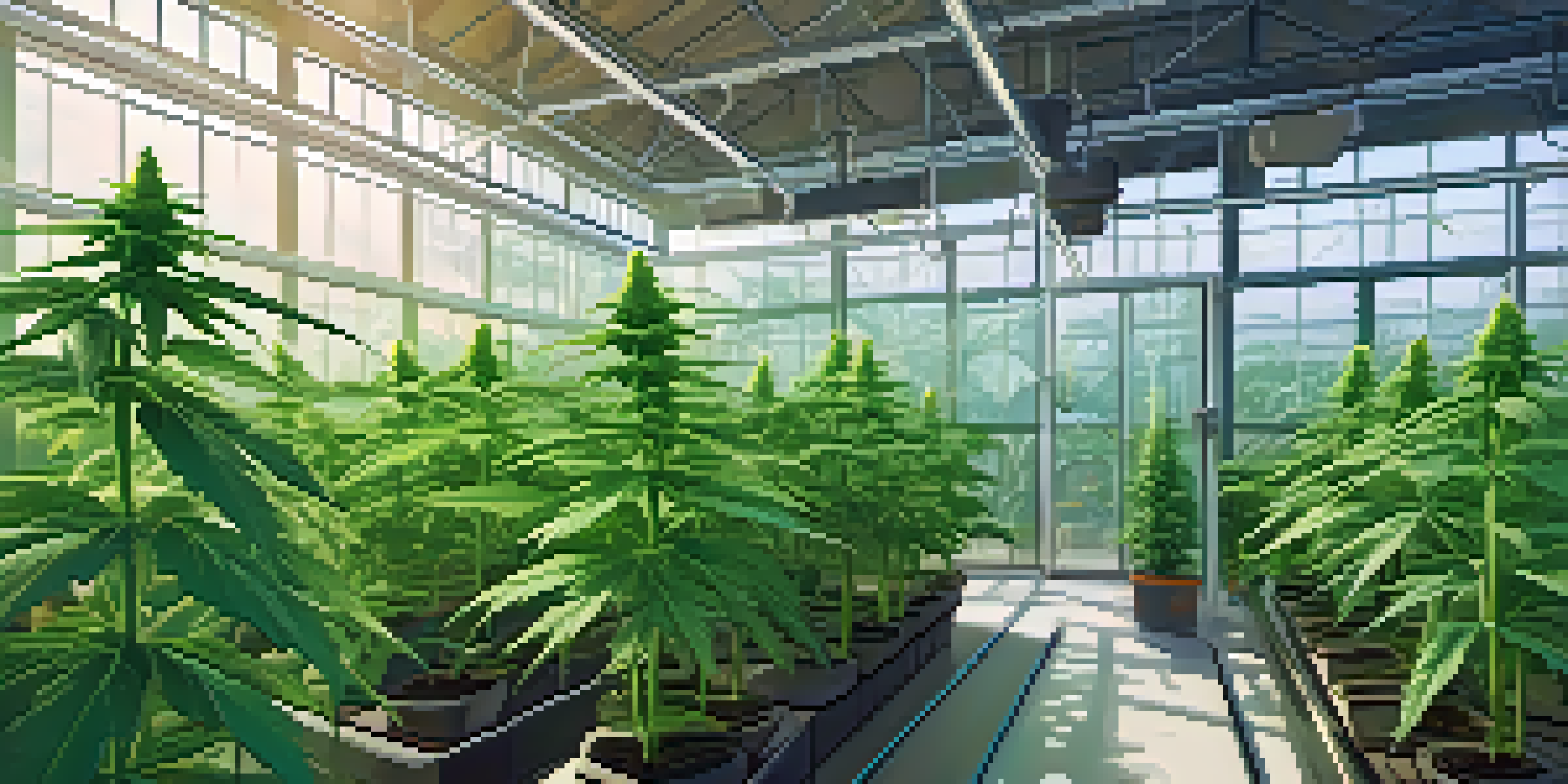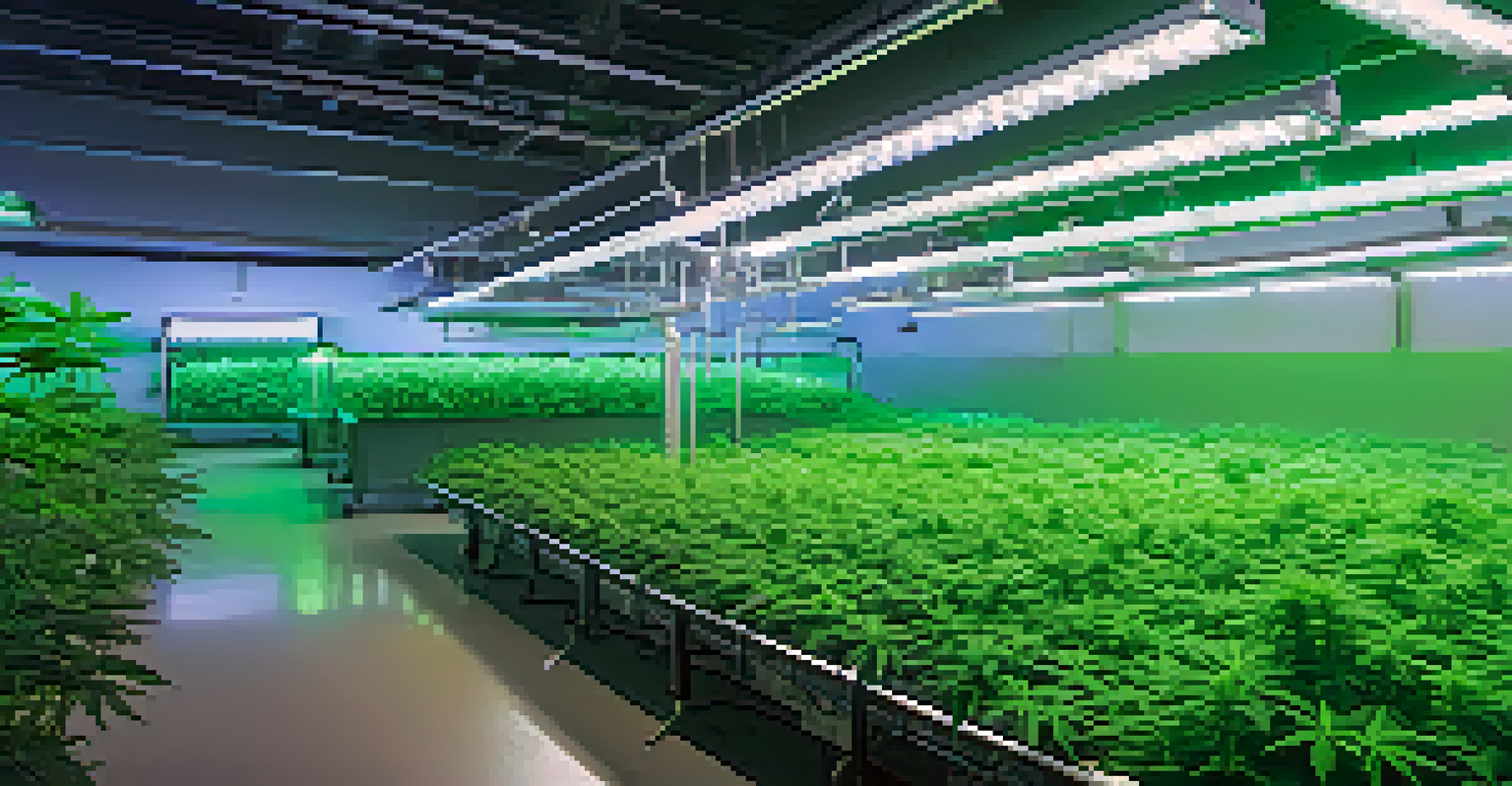The Role of IoT in Cannabis Cultivation and Regulation

Understanding IoT: A Game Changer for Cannabis Industry
The Internet of Things (IoT) refers to the network of interconnected devices that can collect and exchange data. In the cannabis industry, this technology is revolutionizing cultivation practices by providing real-time insights into plant health and growth conditions. Imagine sensors monitoring temperature, humidity, and soil moisture levels, sending alerts directly to growers' smartphones.
The Internet of Things is not just a trend; it is a fundamental shift in the way we interact with our environment, and this is particularly transformative for industries like cannabis cultivation.
This capability not only enhances efficiency but also allows for precise environmental control, ultimately leading to healthier plants and higher yields. For example, if a sensor detects that the humidity is rising too high, the grower can quickly adjust ventilation systems. This proactive approach minimizes potential crop losses and optimizes resource use.
Furthermore, IoT fosters a more sustainable approach to cultivation. By using data-driven decisions, growers can reduce water and nutrient waste, making the process more environmentally friendly. This shift not only appeals to eco-conscious consumers but also aligns with regulatory trends toward sustainability.
Enhancing Crop Monitoring with IoT Devices
IoT devices such as smart sensors and drones play a pivotal role in monitoring cannabis crops. These tools enable growers to gather valuable data on plant health and growth stages, ensuring that every plant receives the attention it needs. For instance, drones equipped with cameras can survey large fields, identifying areas that require immediate care, thus saving time and labor costs.

Moreover, these devices can continuously track factors like light exposure and nutrient levels, allowing for adjustments in real-time. This means that growers can respond to any issues before they escalate, leading to better overall crop health. The ability to monitor crops remotely is a game changer, especially for large-scale operations.
IoT Enhances Cannabis Cultivation
The Internet of Things (IoT) provides real-time data insights that improve environmental control and increase crop yields in cannabis farming.
In addition to crop health, IoT devices can help track the growth cycle of each plant, providing insights into the best harvesting times. This data not only boosts productivity but also enhances the quality of the final product, which is crucial in the competitive cannabis market.
Streamlining Irrigation Systems with IoT Technology
Water management is critical in cannabis cultivation, and IoT technology simplifies this process significantly. Automated irrigation systems equipped with moisture sensors can determine when plants need water, ensuring they receive the optimal amount without waste. This precision is essential in preventing overwatering, which can lead to root rot and other issues.
Data is the new oil, and in the cannabis industry, leveraging data through IoT can lead to unprecedented efficiency and compliance.
For instance, a grower can set up a system that triggers watering only when soil moisture drops below a certain threshold. This not only conserves water but also ensures that plants thrive in a consistent environment. By effectively managing water resources, growers can also reduce operational costs, ultimately improving profitability.
In addition to saving resources, smart irrigation systems can be programmed to adjust schedules based on weather forecasts, ensuring that plants receive adequate care even during unexpected weather changes. This proactive management approach is essential for maintaining healthy crops and achieving higher yields.
Data-Driven Insights for Cannabis Cultivators
One of the most significant benefits of IoT in cannabis cultivation is the wealth of data it generates. This data provides growers with insights into their operations, helping them make informed decisions based on real-time information. By analyzing trends and patterns, cultivators can optimize their practices, from planting to harvesting.
For example, data analytics can reveal which strain performs best under specific conditions, allowing growers to tailor their operations accordingly. This level of precision can lead to enhanced quality and consistency, making products more appealing to consumers and retailers alike. It also aids in forecasting future crop yields based on historical data.
Data Drives Informed Decisions
IoT technology generates valuable data that helps growers optimize practices, ensuring better quality and consistency of cannabis products.
Moreover, these insights can support compliance with regulatory requirements by providing necessary documentation and reports. Having accurate data readily available simplifies the process of meeting legal obligations, allowing growers to focus more on cultivation and less on paperwork.
Ensuring Compliance Through IoT Monitoring
Compliance with regulations is paramount in the cannabis industry, and IoT technologies can help ensure adherence to these laws. By utilizing connected devices to monitor every aspect of cultivation, growers can maintain detailed records that are crucial for audits and inspections. This includes tracking environmental conditions, nutrient usage, and even employee access to facilities.
For instance, temperature and humidity logs can be automatically recorded and stored, providing a clear trail of compliance efforts. This not only protects growers during inspections but also builds trust with regulators and consumers. The transparency offered by IoT systems can be a significant competitive advantage.
Furthermore, IoT technology can assist in maintaining security protocols by monitoring access to growing facilities. Smart locks and surveillance systems can alert growers to unauthorized access, ensuring that security measures are always in place. This comprehensive approach to compliance and security helps cultivate a trustworthy brand image.
The Future of Cannabis Cultivation with IoT Innovations
As IoT technology continues to evolve, its impact on cannabis cultivation is expected to grow even more profound. Future innovations may include advanced predictive analytics that forecast plant needs based on historical data and environmental conditions. This could lead to a new era of precision agriculture where every plant's requirements are met with pinpoint accuracy.
Additionally, the integration of artificial intelligence (AI) with IoT could streamline operations further, allowing for automated decision-making in cultivation processes. For example, AI algorithms might analyze data from multiple sources to optimize growing conditions autonomously, freeing up growers to focus on strategy and innovation.
Compliance Made Easier with IoT
IoT monitoring systems help cannabis cultivators maintain detailed compliance records, facilitating audits and enhancing transparency.
Moreover, as consumer demand for cannabis products increases, the need for scalable solutions will become more pressing. IoT technology offers a pathway to scale operations efficiently while maintaining quality and compliance. This adaptability will be crucial in navigating the competitive cannabis landscape of the future.
Challenges and Considerations in IoT Implementation
While the benefits of IoT in cannabis cultivation are significant, challenges remain in its implementation. One major concern is the initial investment required for smart technology and infrastructure. Many smaller growers may struggle to afford these upfront costs, which could limit their ability to compete in an increasingly tech-driven market.
Additionally, data privacy and security are critical issues that cannot be overlooked. As growers collect and store vast amounts of data, they must ensure that this information is protected against breaches and unauthorized access. Implementing robust cybersecurity measures is essential to safeguard sensitive business information.

Lastly, the rapid pace of technological advancement means that growers must stay updated with the latest IoT trends and tools. This requires not only financial investment but also a commitment to ongoing education and training. Despite these challenges, the potential rewards of adopting IoT solutions make it a worthwhile consideration for cannabis cultivators.